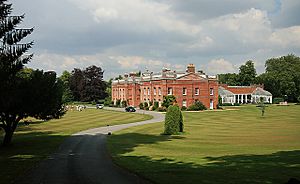George Rodney Brydges facts for kids
George Rodney Brydges was an English politician who lived from the late 1600s to the early 1700s. He was a member of the Whig party. He served in the English and British Parliaments for many years, representing different areas like Haslemere and Winchester.
Contents
Early Life and Family
George Brydges was the second son of Sir Thomas Bridges. His mother was Anne Rodney. He started his career as a captain in the Duke of York's army company around 1673. He served in the Portsmouth area.
In 1677, George Brydges married Anna Maria Talbot. She was the widow of the 11th Earl of Shrewsbury. This marriage helped him improve his financial situation.
A Career in Politics
In 1678, George Brydges got a job as a Groom of the Bedchamber. This was a position in the King's household. He also became involved in local government in Staffordshire.
Around 1685, he bought a large estate called Avington Park. He made many changes to the house. King Charles II even stayed there while his own house was being built nearby. When James II became King in 1685, Brydges lost his job as Groom of the Bedchamber. However, he remained loyal to the King until the Glorious Revolution.
Serving in Parliament
George Brydges was first elected to Parliament in 1690. He became a Member of Parliament (MP) for Haslemere without anyone running against him. He was re-elected for Haslemere in 1695.
In 1701, he was elected as an MP for Winchester. He won this election after a contest. He was re-elected for Winchester in 1701 and again in 1702.
He continued to serve as an MP for Winchester. In 1705, he supported the King's chosen candidate for Speaker of the House. He also supported other government policies.
Whig Party Member
In 1708, George Brydges was re-elected for Winchester as a Whig. The Whigs were one of the main political parties at the time. He often spoke for the Whigs in Parliament.
He supported new laws, like allowing Palatines (people from a region in Germany) to become British citizens in 1709. He also supported the impeachment of Dr. Sacheverell in 1710.
He was re-elected without opposition in 1710. He was less active in Parliament during this time. He was elected one last time in 1713.
Later Years
Just before his last election, George Brydges became very ill. He passed away in 1714. He was buried on February 9, 1714. His son, George, took over his estate.
 | John T. Biggers |
 | Thomas Blackshear |
 | Mark Bradford |
 | Beverly Buchanan |


